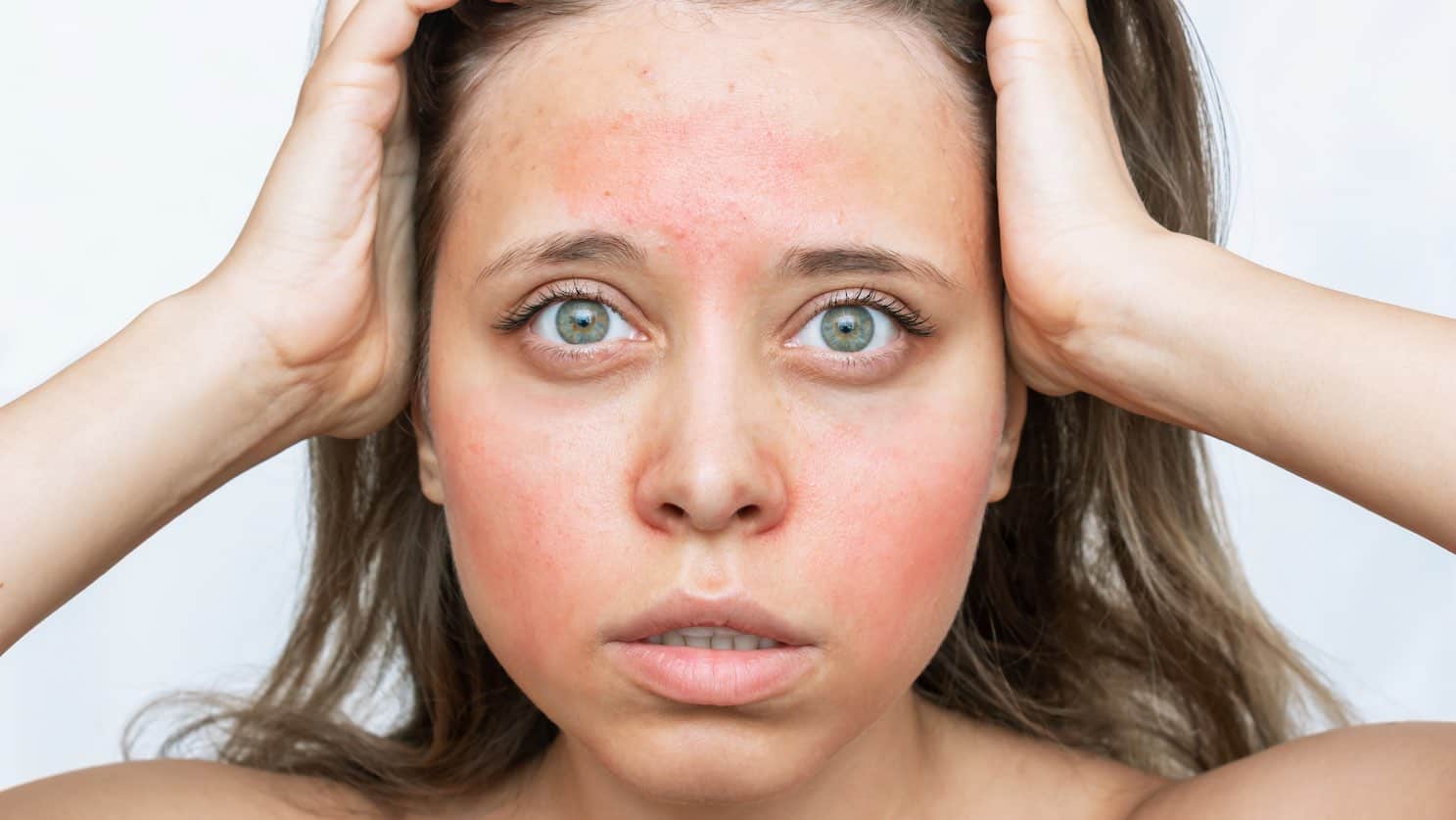“I think I have COVID,” a member of our staff wailed when she checked in for a Costhetics Zoom meeting this week.
“My eyes are burning, and my skin feels like it’s on fire. I don’t know what to do.” Of course we advised her to see her doctor. What she learned surprised her, and it may surprise you. Her symptoms were due to an allergy to the cosmetics she had been using.
Before You Read Another Word, Read This …
Allergic reactions to cosmetics can have serious consequences. Stop reading this article and contact your doctor if you are experiencing:
- Difficulty breathing
- Light-headedness
- Blue skin or lips
- Swelling of mouth and/or throat
- Confusion
- Loss of consciousness
These are symptoms of a severe type of allergic reaction known as anaphylaxis, which can be life-threatening. It can also be treated effectively when addressed quickly, so don’t delay.
Now where were we? Ah yes, common allergic reactions to cosmetic products …
Who Is at Risk for Allergic Reactions from Cosmetics?
The short answer: you are. The problem is quite common, and some studies show as many as 1-in-10 women who use cosmetics will develop an allergy at some point in their lifetimes. “This figure may be much higher as many mild reactions occurring at home are self-diagnosed and often self-treated,” observes DermNet.
Why such a high number, you ask? Good question. The average woman uses as many as seven different cosmetic products each day, courting an allergic reaction from favourite products including facial care products, make-up, sunscreen, soaps and deodorants, toothpaste and mouthwash, and even nail care products.
Isn’t Cosmetic a Good Thing?
What do we mean when we say cosmetic? For the purposes of this discussion, a cosmetic as defined by the dermatologists at DermNet NZ is, “a topically applied product that is used to beautify, cleanse or protect the hair, skin, teeth, or complexion.” In other words, cosmetics are the things we use every day in almost every imaginable way.
The ingredients in our beloved cosmetics are tested comprehensively for both safety and efficiency. As we learned from our Costhetics colleague and her dermatologist, however, many of them can still trigger an allergic skin reaction. Perhaps you’ve already experienced one yourself but didn’t realise it.
Cosmetic Allergic Reactions Take Different Forms
When a cosmetic ingredient hits your skin, one of two things can happen. It can make things better, or it can trigger one of these common reactions:
- Contact urticaria
- Anaphylaxis
- Contact dermatitis
- Photo-contact dermatitis (related to sun exposure)
Some of the most common symptoms include:
- Hives
- Rash
- Flaking skin
- Blisters
- Itchy skin
- Swelling
- Eye irritation
You can find a comprehensive listing of types of reactions and the symptoms that accompany them here.
What to Do if You Suspect a Cosmetic Allergic Reaction
Different approaches are best for different sorts of reactions. Contact dermatitis often resolves on its own once the allergen is removed. Photo-contact dermatitis may reverse if your sun habits change. Items you can consider include hydrocortisone creams or ointment to control itching, redness, and swelling. Skin emollients can replenish moisture and ease dryness.
The problem with this approach is that you may end up doing more harm than good. The ingredients in the medication you choose may contribute to your skin problem rather than relieve it. In fact, the wrong treatment could easily aggravate your skin even more. It’s difficult to pick the right OTC treatment when you aren’t certain what is causing the allergic reaction. What do you do?
Costhetics has a simple rule when it comes to health, “When in doubt, ask a professional.” In the case of a cosmetic allergy, a consultation with a dermatologist is a good first step. A skincare expert can help determine whether you are suffering from a cosmetic allergic reaction or a skin disease, such as atopic dermatitis or seborrheic dermatitis.
A dermatologist can help get to the bottom of your allergic response to a cosmetic with:
- Patch tests
- Blood tests
- Open application test (a possible irritant is applied directly to the skin)
After testing, your doctor may recommend prescription-strength steroidal ointments or oral antihistamines to relieve your symptoms.
Help for Allergic Reactions to Cosmetics
There is no need for you to suffer through a reaction to a cosmetic product when relief is available. If finding a skincare professional in your area is adding a headache to your other symptoms, don’t do anything rash. (Tee hee) Costhetics can help. Contact us for guidance.
